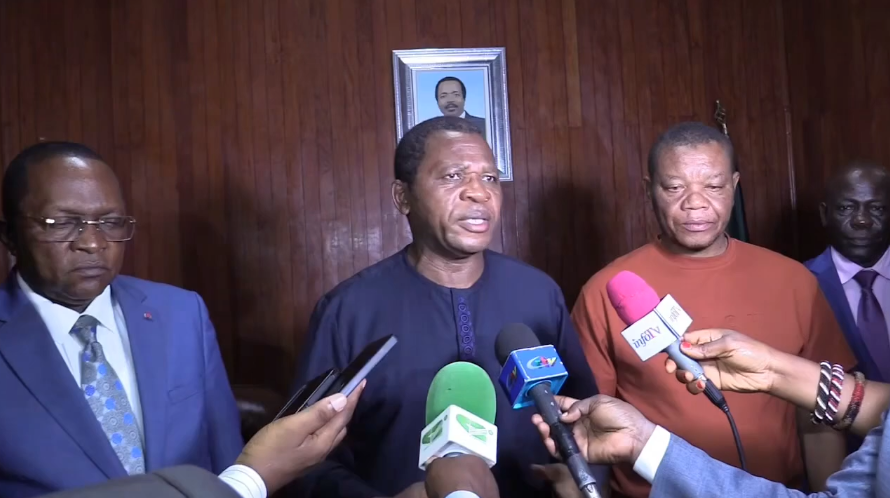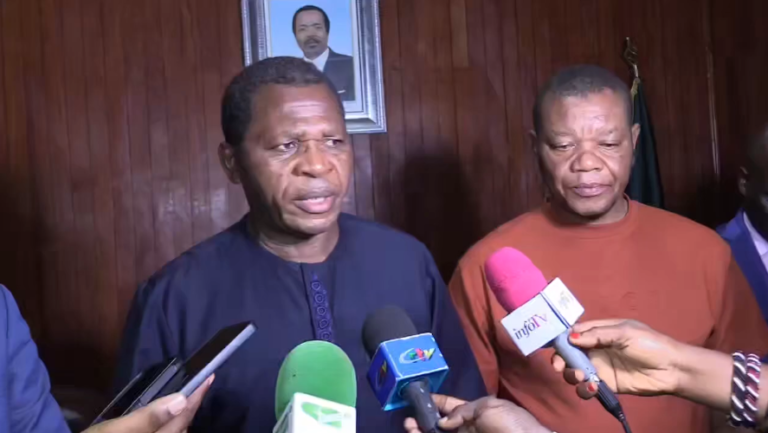YAOUNDÉ, Cameroon – Cameroon’s Territorial Administration Minister, Paul Atanga Nji, has publicly acknowledged that the government engaged in discussions with the abductors of Roland Ewane, the Divisional Officer (D.O.) for Idabato, to secure his release after more than five months in captivity. This revelation comes in stark contrast to the government’s long-standing position against negotiating with what it labels as “terrorists and kidnappers.”
Ewane, who was kidnapped on October 1, 2024, by a group of armed men suspected to be maritime pirates operating in the Bakassi Peninsula, was freed on March 17, 2025. His captors had initially demanded a ransom of 700 million CFA francs (approximately 1.2 million USD) for his release. While the government has not disclosed whether a ransom was paid, Atanga Nji’s statements strongly indicate that negotiations and possible settlements were part of the process.
Speaking at a press briefing in Yaoundé on Tuesday, Atanga Nji praised Ewane for his resilience, stating, “When you are in difficulties and you are discouraged, it’s not a good sign. So he remains a seasoned administrator despite all the difficulties.” He thanked President Paul Biya for “all that he has put in place” to secure the official’s release.

However, his most striking admission was his acknowledgment that the government engaged in diplomatic efforts and direct discussions with the kidnappers. “We had diplomatic connections, we had discussions with all these stakeholders – the security services, the administrative authorities, and all those who could give us any relevant information to go and discuss with those kidnappers,” Atanga Nji stated.
This statement raises critical questions about the government’s credibility, given its repeated insistence that it does not negotiate with criminals, separatists, or insurgents. For years, authorities in Yaoundé have maintained a hardline approach, ruling out dialogue with armed groups in the Southern Cameroons conflict and denying allegations of ransom payments for hostages.
Atanga Nji detailed multiple failed attempts to rescue Ewane before a successful breakthrough. “We have tried two or three times, and we were very close to taking him, but at the last minute, they (kidnappers) would change their conditions. In December, we could have released him, but it was very difficult. We had another second attempt around the 15th of January, but it didn’t work. We had to try all over again, and this time it was good,” he revealed.
The minister’s comments strongly suggest that Cameroon’s government was actively engaged in a complex negotiation process with the kidnappers over several months. This contradicts its publicly stated position that it does not engage in any form of dialogue with criminal elements.
Following his release, Ewane was transported from Buea to Yaoundé, where he was officially unveiled by the government in a press conference that appeared to be carefully choreographed. Notably, when Ewane’s convoy arrived at the Governor’s office in Buea on Monday, he was not immediately presented to the public. Instead, authorities stated that only Yaoundé had the right to formally “unveil” him, treating the moment almost as a political trophy.
Atanga Nji assured the public that Ewane would undergo medical check-ups before resuming his duties. He also hinted that negotiations were ongoing for the release of another hostage, the Assistant Mayor of Idabato, who remains in captivity.

While government officials have refrained from confirming whether any ransom was paid, the mere fact that negotiations took place undercuts the hardline rhetoric Yaoundé has used against kidnappers and separatists in the country’s conflict-ridden Ambazonia.
The government’s handling of Ewane’s release has sparked debate over whether it has set a precedent. Critics argue that by engaging in talks with criminal elements, Cameroon risks incentivizing more kidnappings, as groups may now see abductions as a lucrative means to extract money or concessions from the state.
The release of Roland Ewane is undoubtedly a relief for his family and colleagues. However, the manner in which his freedom was secured raises questions about the government’s credibility and consistency in handling crisis or conflict situations. Whether a ransom was paid or not, the official acknowledgment of direct discussions with kidnappers is a striking admission that will likely fuel further scrutiny of Cameroon’s impunity for not sitting down to dialogue with Ambazonia independentists.
As negotiations reportedly continue for the release of the Assistant Mayor of Idabato, the public remains keen to see whether the government will maintain its stance of non-negotiation—or if, as in this case, it will again engage in quiet settlements while denying them publicly.

